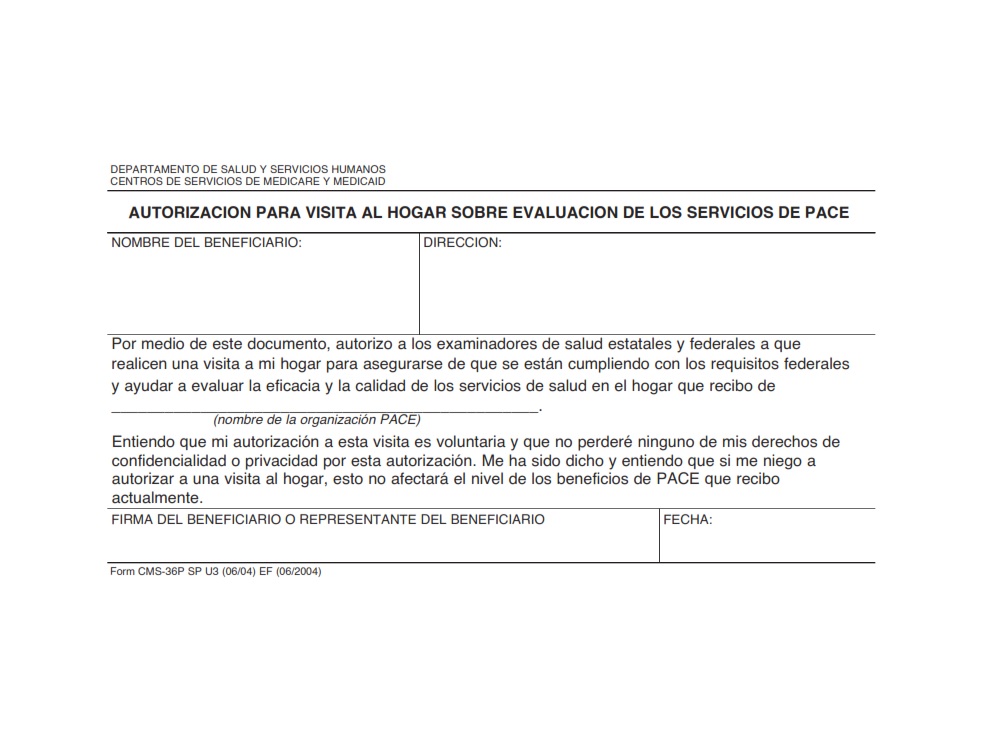CMSFORM.ORG – CMS 36P – CONSENT FOR HOME VISIT FOR PACE SERVICES EVALUATION (Spanish) – Imagine the dynamic landscape of healthcare unfolding right at your doorstep. As we navigate an era of evolving medical practices, the concept of home-based care has emerged as a beacon of personalized support and holistic wellness. In this realm of innovative healthcare delivery, CMS 36P – Consent for Home Visit for PACE Services Evaluation stands tall as a gateway to a comprehensive evaluation experience like no other. Step into the realm where comfort meets quality care, where your living space transforms into a sanctuary for health assessment and treatment planning. Join us on a journey exploring the intersection between convenience and expertise, where every corner of your home becomes an opportunity for compassionate care tailored just for you.
Download CMS 36P – CONSENT FOR HOME VISIT FOR PACE SERVICES EVALUATION (Spanish)
| Form Number | CMS 36P |
| Form Title | CONSENT FOR HOME VISIT FOR PACE SERVICES EVALUATION (Spanish) |
| Published | 2002-07-01 |
| O.M.B. | – |
| File Size | 490 KB |
What is a CMS 36P?
A CMS 36P is a crucial document used in healthcare settings for obtaining consent for home visits related to PACE (Programs of All-Inclusive Care for the Elderly) services evaluation. This form ensures that patients are informed about the purpose and nature of the home visit, granting permission for healthcare professionals to conduct an assessment in their residence. By engaging with patients on their own turf, this approach allows for a more comprehensive evaluation and tailored care plan development.
The CMS 36P signifies a patient-centered model where individual needs and preferences are prioritized, fostering a sense of respect and empowerment within the care process. Additionally, this consent form underscores the importance of delivering holistic care that factors in not just medical conditions but also environmental factors influencing an individual’s well-being. Through these home visits facilitated by CMS 36P consent, healthcare practitioners can gain deeper insights into the daily lives and challenges faced by patients, leading to more effective and personalized care strategies.
Where Can I Find a CMS 36P?
If you are in need of a CMS 36P form for consent for a home visit for PACE services evaluation, there are several avenues you can explore to obtain it. The first place to check would be the official website of the Centers for Medicare and Medicaid Services (CMS), where many standard forms like the CMS 36P can be easily accessed and downloaded. Alternatively, you can reach out directly to your healthcare provider or the organization offering PACE services as they should have the necessary forms available.
For those who prefer a more hands-on approach, visiting local healthcare facilities or community centers may also lead to acquiring a physical copy of the CMS 36P form. Additionally, specialized medical supply stores or organizations catering to senior care may have these forms on hand for distribution. Remember that when accessing such important documents, ensure their validity and authenticity before proceeding with any formal evaluations or processes requiring them.
CMS 36P – CONSENT FOR HOME VISIT FOR PACE SERVICES EVALUATION
Imagine a world where healthcare services are tailored to meet you at your doorstep, a world where the focus is on bringing care directly to those in need. This vision comes closer to reality with the introduction of CMS 36P – Consent for Home Visit for PACE Services Evaluation. This form signifies a shift towards a more patient-centered approach, acknowledging the importance of evaluating individuals within their own environment.
The consent for home visit encapsulates the essence of personalized care by recognizing that each individual’s circumstances are unique and should be evaluated in familiar surroundings. By offering this option, PACE services open up new possibilities for assessing and delivering care that truly reflects an individual’s needs, preferences, and lifestyle. It also emphasizes the significance of understanding the holistic picture of a person’s health by considering their social and environmental factors in conjunction with medical evaluations.
